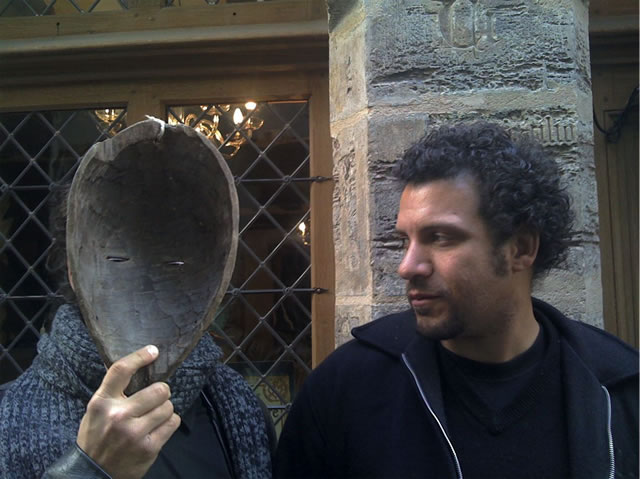Moment's Notice
Recent CDs Briefly Reviewed
Alexandre Pierrepont + Mike Ladd
Maison Hantée
RogueArt ROG-0017

In Alexander Pierrepont and Mike Ladd’s remarkable Maison Hantée (Haunted House), poetry and music dovetail into one of the most conceptually elegant and musically satisfying words-and-sound constructions ever recorded. Built in the studio out of the raw materials of improvised music, spoken word, and digital sampling, this “poetry with an orchestral conception” (as Pierrepont describes it) integrates imagination and reality, words and music, sound and technology to form a soundscape at once familiar and alien. It’s a work haunted by the unknowable past, bewildered by desire, anxious about the slippery boundaries between self and other, words and reality, words and music. It is full of questions and observations, but its offers no answers. It is both beautiful and chilling.
For all the album’s many ambiguities, the floor plan is sharply defined. There are three “floors” inhabited by twenty players. The first floor is the voices of actor Stéphane Gombert, reading the words of Pierrepont in French (translations are provided in the CD booklet), and poet-producer Ladd reciting his own text. A second floor or layer of “Echoes and Shadows” consists of samples of the improvised music arranged and orchestrated by Ladd and sound engineer Gymkhana. The third layer consists of “improvised trance music” recorded as a continuous piece by William Parker on guimbri and Hamid Drake on frame drum. This layer of “Currents and Undercurrents” is a ghostly presence throughout the piece, materializing in the foreground in some chambers, fading away into the background in others.

Alexandre Pierrepont, Mike Ladd Courtesy of RogueArt
Pierrepont’s writing is sectioned off into chambers. They are, he makes a point of saying, neither poems nor songs, and perhaps because a poem contains words only, and in this work, each chamber harbors both words and music; certainly song form is nowhere to be found. Ladd’s words spiral around the building, appearing in three places, like a vine curling up the walls. Within the each chamber, voices interact with different improvisers (Guests and Ghosts), including Roscoe Mitchell, Evan Parker, Joe Morris, Craig Taborn, and Thurston Moore, among others.
The arrangement of words and music in the chambers is as careful and as architecturally sound as a Bartok string quartet or a Coltrane solo. It forms a vaguely peaked-roof shape, beginning with Gombert and Mitchell on alto, then words and samples, rising through increasingly populated chambers to reach an apex with guitarists Thurston Moore, Gene Moore, and Bill Nace in “Chamber 20” and then Morris and Jeff Parker, and saxophonist Matana Roberts, in the following “Chamber 72.” The chambers then slowly depopulate, winding back down through Ladd- William Parker-Drake, words and sampling, and Evan Parker on soprano. An opening “Hall” and a concluding “Corridor” lead up to and away from the chambers. This arrangement feels right, not forced or schematic in the least. It’s a sturdy and well-defined framework; it’s just that what goes on within it is maddeningly hard to pin down.
The essentially unknowable nature the world, the inadequacy and beauty of words, the permeable barriers between the self and others, imagination and words are the true subjects of Maison Hantée. “I speak to you, I satisfy you. I incorporate you, I chew you over. I spit you out. I shift your words into mine and mine into yours. I am a plunderer. I am a cannibal, we look the same,” Pierrepont writes in “Chamber 3.” Confronted by time, the numinous presence of the unknown, or the fierceness of sexual desire the poem breaks down into irrational, surrealist imagery. We are haunted by the specters of things we cannot fully encompass with our words, our rational thoughts, or our imaginations. Still, language and the imagination are beautiful traps. They give us much to marvel at, enjoy, feel, and Pierrepont’s poetic edifice is by turns ecstatic and sad, enigmatic and concrete, filled with dread and wonder, alienation and familiarity.
The interpenetration of word and music mirrors what happens between word and self, past and present, and between self and other. Words are one center of meaning in the work, but in Maison Hantée nothing works in isolation. The words were recorded with the improvisers whenever possible. This is the kind of interaction most familiar to jazz listeners: the poet accompanied by music. But here, the relationship is more complex than that. Pierrepont wrote some of the chambers with specific improvisers in mind, the music was shaping—perhaps it’s better to say haunting—the words before any performance took place. The opening “Chamber 12” and the final “Chamber 21” were written with the circular breathing methods of saxophonists Mitchell and Parker in mind, so the words tangle and overlap in multi-tracked torrential outpourings. In addition, Pierrepont provided not only his poetry, but also instructions to guide the improvisers that are hidden from the listener. For instance, he was thinking of keyboardist Taborn and cornetist Rob Mazurek while writing “Chamber 73” and at the recording session explained to them that in that chamber, “we are underwater, we are in the middle of sonic sonars of the unconscious.” Thus the imaginative connection between Pierrepont and specific musicians, and the musician’s imaginative interpretation of the written words and verbal instructions build the house together.
The music itself is subject to the same permeability of self and other, past and present as the words. Certainly the spirits of Don Cherry and the music of West Africa are among the ghosts that haunt the duet played by William Parker and Drake, as completely individual and utterly contemporary as it is. Morris and Jeff Parker interact in their duet in ways that shape their individual playing in subtle ways. Ladd’s sampling and re-ordering of pre-existing music can be seen another example of the imagination transforming an objective phenomena. Words and music behave in similar ways, perhaps they are closer in nature to one another than we might think.
–Ed Hazell
